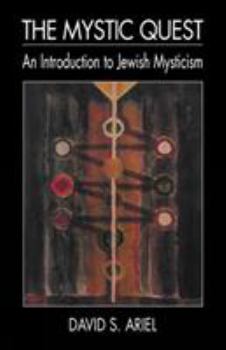The Mystic Quest: An Introduction to Jewish Mysticism
The Mystic Quest explains the major ideas and concepts of Jewish mystical thought in a way that the general reader can clearly understand. Drawing upon his own extensive research as well as on the growing body of scholarly material on the subject, Dr. David Ariel, president of the Cleveland College of Jewish Studies, presents the extremely difficult and complex elements of Jewish mysticism in language that makes it accessible to the layperson...
Format:Hardcover
Language:English
ISBN:0876689284
ISBN13:9780876689288
Release Date:July 1977
Publisher:Globe Pequot Publishing Group Inc/Bloomsbury
Length:256 Pages
Weight:1.31 lbs.
Dimensions:1.1" x 6.3" x 9.3"
Related Subjects
Jewish Life Judaism Kabbalah Mysticism Religion Religion & Spirituality Sacred Writings TheologyCustomer Reviews
4 ratings
Understandable and deep
Published by Thriftbooks.com User , 16 years ago
I got the recommendation for this book from Huston Smith's The World's Religions. The fact that Smith selected this book was enough for me. Ariel, the author, combines understandability with depth.
Informative and provoking
Published by Thriftbooks.com User , 19 years ago
Ariel starts with a good background on mysticism, the importance of individual experience and the uniqueness of Jewish mystics. He starts the history of mysticism with Ezekiel, and includes both German Hasidism and Safed on the Galilee. His inclusion of interpreted text from Zohar was revealing as well as Lekha Dodi, and I would have liked more such passages. On "The Character of Jewish Mysticism" he states "Before there is mysticism, there is religion". But another view is that the individual experience does not require faith or knowledge. Being a book, perhaps he also does not emphasize the Oral tradition enough. The discussion on Sefirot, and "calculus" of the divine world, was difficult, but that difficulty may have been mine; with concepts of emanation as "self-contraction" or "man is conceived as a structure parallel to and analogous with the Sefirot". Ariel also continues with the metaphor of the "human soul upward toward the heavens", but Rabbi Albert Green has presented a metaphor of Jewish mysticism as inward. I appreciated the references to Isaac Bashevis Singer, and will read some of his works. Since the writing of this book (1988) there has been a more popular appeal, and I have heard that Jewish mysticism is now taught in rabbinical school.
Well-written, accessible, and Jewishly authentic
Published by Thriftbooks.com User , 21 years ago
This is one of the better introductions to Jewish mysticism on the market today. Although written in an academic style (plenty of citations, footnotes, etc.) it is still spirit-filled and inspiring. Unlike the overly-ponderous works of Gershom Scholem, this is a book that the average person with a college-level reading ability can pick up and understand. The author, David Ariel, is (or was at the time this was published) President of the Cleveland College of Jewish Studies, and, I would assume, produced this book to fill a gap in the usual (i.e., heavily Christian/gentile) college philosophy curriculum. By doing so, he has no doubt educated quite a few professors as well as their students in the beauty and complexities of various forms of Jewish mysticism.Ariel begins with the question "What is mysticism?" and a discussion of some non-Jewish writers on mystical topics, such a William James, Sigmund Freud, Aldous Huxley, Evelyn Underhill, etc. -- names whose works are generally more familiar to philosophy students than those of the Jewish mystics. He then goes on to present the basic concepts of Jewish mysticism (kabbalah) chapter by chapter, drawing on commentaries, Zohar, classical anecdotes from Jewish tradition, excerpts from the synagogue liturgy, etc.One of the best features of this book is Ariel's gift for translating "archaic" symbols into modern language. On pp. 98-99, for example, he give a glossary of kabbalistic symbols and terms, then challenges the reader to use them to decipher a cryptic passage from the Zohar -- which becomes quite clear, once you understand the "code." He does an equally nice job with "Lecha Dodi," a Sabbath hymn that every Jewish congregation sings on Friday evening, but whose deeper kabbalistic meanings are seldom understood. His original translations of source materials are also excellent, making this a very accessible book without "talking down" to the reader. Highly recommended.
An Excellent and Lucid Introduction
Published by Thriftbooks.com User , 25 years ago
I'm currently reading this book along with many others related to mysticism. This is an excellent and clearly presented introduction to Jewish mysticism. The chapter titles are as follows: 1) Seekers of Unity: The Nature of Mysticism 2) Bridging the Abyss: The History of Jewish Mysticism 3) Living with the Abyss: The Character of Jewish Mysticism 4) The Hidden and the Revealed: The Principles of Jewish Mysticism 5) The Calculus of the Divine World: The Teaching of the Sefirot 6) The Shekhinah: The Feminine Aspect of God 7) Language and Being: The Torah as God's Emanation 8) The Oneness of Being: The Destiny of the Soul 9) The Mystic Drama: The Religious Life of the Jewish Mystic 10) Uplifting the Sparks: Modern Jewish Mysticism 11) Jewish Mysticism and the Mystic QuestFor those interested in Christian Mysticism, check out the multi-volume "The Presence of God" series by Bernard McGinn, esp. the first volume "The Foundations of Mysticism." - Brad Clark





